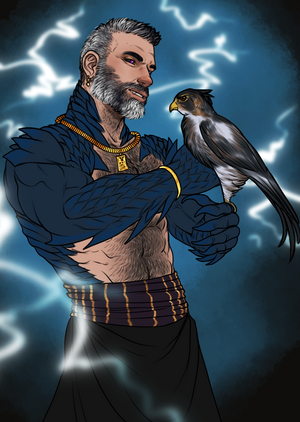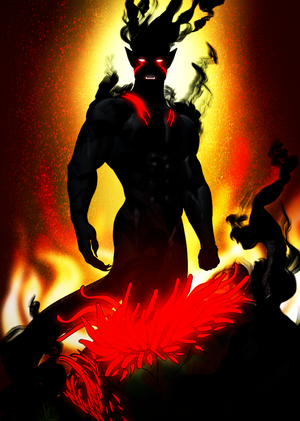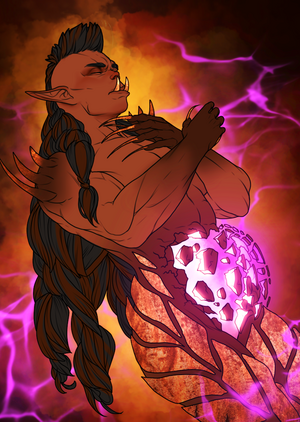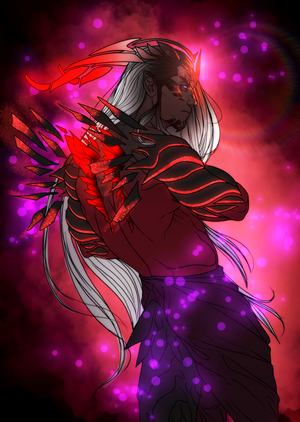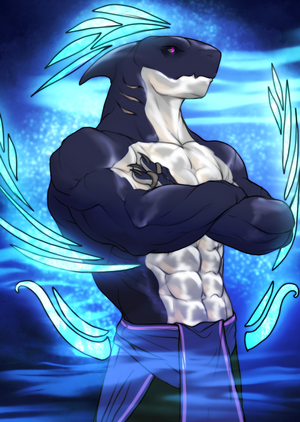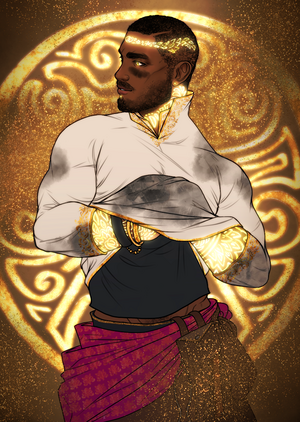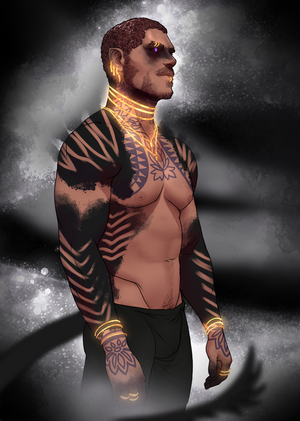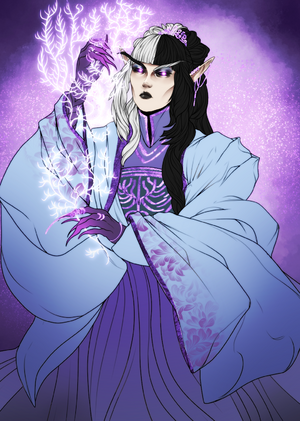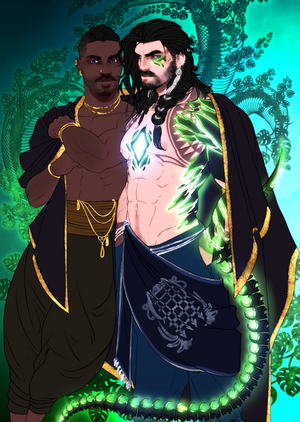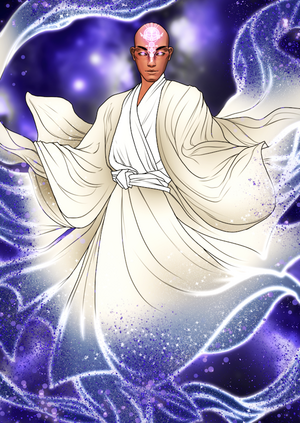More actions
mNo edit summary |
|||
| Line 1: | Line 1: | ||
==Gods and Goddesses== | |||
Draconism has a total of 12 Gods, split equally over 3 Pantheons. Unlike Fornoss where it is possible to worship only one specific Pantheon, Draconists must worship all Gods of all Pantheons equally. They may however choose one specific Dragon God(dess) who they particularly feel represented by or connected with, and that will be their Patron God(dess). Conflict between Draconists generally speaking only exists on ideological lines with how to deal with Spirits/Mages/Afflicted, but this conflict should never be so deep as to fracture the believers. There is general permission for the faithful to disregard/refuse assistance/ridicule/denigrate if something happens that violates their Pantheon's Ideology, but they should never attack, exclude, or sabotage other Draconism worshipers outright. | |||
===Regulus, the Blue King Dragon=== | |||
{| | |||
|- | |||
| rowspan="4" | [[File:Cedragoin.png|300px|caption|left]] | |||
| style="font-weight:bold; width:75px; vertical-align:top;" | Description | |||
| style="vertical-align:top;" | | |||
Regulus is a complicated Dragon for a variety of reasons. As a recently awoken Dragonsoul from a mortal host, Regulus has lived both the life of a mortal Ailor, and now an immortal Dragon. Equally, this Dragon is meant to be the conclave leader and mediator who keeps peace between Dragons who are likely to feud both over their territory, and ideologies. This contrast between a mortal life and an immortal one has brought both great progress through revolutionizing the way Dragons have thought about the way the world works, but also great chaos. The old Regulus harkens to tales of regalness, composure, and sagely words. The modern iteration is often seen as a capricious clown who somehow stumbles into making the right decision by accident while obfuscating everyone with nonsense words, or unpredictable outbursts of bad temper. Despite all of this, Regulus is credited with having returned nearly all the Dragons to material reality with his Draconic allies, including the help of Regalia's Dragon Cult. While he makes many missteps on the way to progress, he is still seen as the one true leader of the Draconic conclave, especially because he was once a mortal, which brings in a unique perspective that the other often detached or haughty Dragons are unable to empathize with. In he many tangible interactions Regulus has had with mortals in Regalia and beyond, he perhaps imparts one of the most important lessons of all, in that the faithful shouldn't take themselves, their task, or any obstacles they face too seriously, and that people can legitimately die from lack of laughter and joy or loneliness. | |||
|- | |||
| style="font-weight:bold; width:75px; vertical-align:top;" | Virtues | |||
| style="vertical-align:top;" | | |||
Regulus imparts the most important virtue among all the Draconists, which has remained unchanged between his reincarnations, which is the preservation of life. To all Draconists, preserving life and fighting for the preservation of life in small or big ways is always a virtue. This can include being a nurse or doctor, fighting to protect the innocent and weakened who could otherwise not stand up to defend themselves, or ridding the world of particularly corrupted and evil persons and beings who cause death beyond what natural causes have been ordained by Umbra. | |||
|- | |||
| style="font-weight:bold; width:75px; vertical-align:top;" | Vices | |||
| style="vertical-align:top;" | | |||
The greatest vice that Regulus preaches against, is idleness and inactive centrism. Due to Regulus rather fence-hopping attitude towards problems in the past, the concept of enlightened centrism had become a virtue among the Draconists. Ambition and drive to make the world a better place is anemic to centrism however, because institutionalized systems of abuse and loss become impossible to fight if those that should fight try to play the middle-ground. Regulus stands for true moderation and mediation, not passivity in the face of turmoil or trouble. | |||
|- | |||
| style="font-weight:bold; width:75px; vertical-align:top;" | Association | |||
| style="vertical-align:top;" | | |||
Regulus as a past incarnation and present, has a strong association with the Anglian-Ailor people in the Regalian Archipelago. His domain has historically been the whole Archipelago, and as a Dragon, Regulus controls the weather around the world, bringing forth rain and thunder, and heralding the change of the seasons and temperatures. It is by his personal involvement that Anglia when it was settled by the Aml Tribes developed a pleasant and mild climate with fertile soil which was perfect for farming. As such, many also see him as a patron of those that produce food and work with plants. | |||
|} | |||
===Cinerius, the Red Passion Dragon=== | |||
== | {| | ||
|- | |||
| rowspan="4" | [[File:Untitled Artwork-3 3jtds.png|300px|caption|left]] | |||
=== | | style="font-weight:bold; width:75px; vertical-align:top;" | Description | ||
| style="vertical-align:top;" | | |||
Cinerius was once known as Caius, the first Dragon to peer into the Void when it first opened, and whose curiosity caused him to become infected with a lethal Void sickness that slowly consumed him. After suffering painfully for 13,000 years Caius succumbed, but from his corpse was born Cinerius the first true Dragon rebirth. Cinerius is in many ways a true return to the roots of Caius, a god of fire and passion from where all drive and ambition and urges come. Cinerius lights the flames of want and need, and makes mortals feel all the right things that make living so rewarding, and why even Demons can be seduced to care about the world they were made to destroy. There is perhaps an irony there, that when Caius's soul was split in two, and Triton first entered the Void, it brought with him the hunger for life that was created by Caius, thus infecting the Demons that then spilled forth into Aloria, who in turn made Caius's sickness worse until Cinerius was born. This has made Cinerius so much more concentrated in his essence, the reason he is depicted as an entity that mortals cannot bear to look at, because even the sight of him would reveal passions and deep desires in their soul that they weren't even aware of, or are too ashamed or fearful to give into. Cinerius also has the other aspects of Caius, in that he is a Dragon of love and family, of feelings and emotions and all the things that give color to life. It was Caius who first willed free will and feelings onto lifeless beings of creation, and Cinerius who now perfects this ancient decision with a deeper connection to revelations about the inner soul. | |||
|- | |||
| style="font-weight:bold; width:75px; vertical-align:top;" | Virtues | |||
| style="vertical-align:top;" | | |||
Cinerius's virtues are to love and feel unconditionally and without restraint. Cinerius places above all the need to be in touch with one's inner wants and needs, and the brazen bravery to reveal them to others, and to act on them, so long as they do not outwardly harm others (and sometimes, even when they do). Cinerius teaches bravery not to bottle up one's feelings, not to withhold one's true thoughts, and to express feelings that are had before the limited time that all mortals (and even immortals, apparently) have, is taken away. His virtue is to celebrate one's loved ones and family. | |||
== | |- | ||
| style="font-weight:bold; width:75px; vertical-align:top;" | Vices | |||
| style="vertical-align:top;" | | |||
Cinerius's greatest desire and where his fires rage loudest, are at the idea of being snuffed out of history without having achieved anything. For Cinerius, there is no greater failure for the individual soul, than to have no ambition, no drive, but above all to have meant nothing to the lives of others, or to the endless rotation of Aloria as it hurtles through the great nothingness of Orion. Rather than a contradiction to Orion's detached enlightenment, this vice and Orion's virtue are complimentary, to achieve enough in life, and reach detachment towards the end for having done enough to make a difference. | |||
|- | |||
| style="font-weight:bold; width:75px; vertical-align:top;" | Association | |||
| style="vertical-align:top;" | | |||
= | Cinerius has inherited Caius's associations with the Eronidas, and Guldar, as well as the Maquixtl. Caius's historical domain was Guldar and Junction West, marking him as one of the most important Dragons. Cinerius has continued this association but seems more somewhere in the middle of Eronidas and Maquixtl from his silhouette, rather than Eronidas-dominated in the past. In the Immortal War, Caius was the general of the Draconic forces, and largely responsible for picking the battles between the Dragons and Draconic forces, as part of continuing, Cinerius relinquished this role to Triton. | ||
|} | |||
===Daiana, the Gray Dreaming Dragon=== | |||
{| | |||
|- | |||
| rowspan="4" | [[File:Dreamdragon.png|300px|caption|left]] | |||
| style="font-weight:bold; width:75px; vertical-align:top;" | Description | |||
| style="vertical-align:top;" | | |||
Daiana is a Dragon in a categorical sense, but she is actually the planet of Aloria itself, though whether she is all of it or only the core of the planet, is unclear. Her exact nature within Draconism is quite unclear, but she has been attributed to the Soul Rivers which are a form of invisible arteries of the world that seed life, and the cycle of birth. While Aurora makes the bodies of creation and Orion lifts them into the afterlife after Umbra has killed them, Daiana creates the seedlings from dead soul matter to seed new life in newborns and thus create new souls. Another aspect of her is that she creates all the Gods of other Religions, at least the Aloria-native ones, though not directly. It is said that Daiana dreams the wills, ambitions, hopes, and fears of the people of societies without divine guidance because they live on her and their feelings affect her as the planet itself. In turn, she dreams of these things, and in doing so manifests the Gods. It is thus not exactly correct to say that she creates the Gods exactly, but that mortals feed her with information, using her dreaming as a conduit to wish into existence their own Gods for divine guidance. It is important in this regard never to appraise Daiana as some mother-Goddess of all Gods because they owe no loyalty to her but to their own followers. Daiana as a Dragon has never been met in person, because as the planet (or its core), she is incapable of manifesting in a humanoid form, though she does produce Godborn through her Dreams who do call her mother. They, and some other Archon, may occasionally perceive visions in which they do see her. | |||
|- | |||
| style="font-weight:bold; width:75px; vertical-align:top;" | Virtues | |||
| style="vertical-align:top;" | | |||
A virtue for Daiana is environmental conscientiousness. Her virtue is not exactly complete environmental protectionism, to some degree Draconists do acknowledge that the planet has the means to heal itself and restore the functions of any ecosystem. Aurora, Daiana, and Gaia can reasonably restore lost plant and animal life and even recover certain geological features, so an occasional factory or strip-mine won't destroy the world. Magic however, is something these three Dragons have difficulty counteracting, so a virtue is to remove lingering corrosive magic from environments. | |||
|- | |||
| style="font-weight:bold; width:75px; vertical-align:top;" | Vices | |||
| style="vertical-align:top;" | | |||
A vice for Daiana is disregard for the value of a life. This may sound similar to Regulus's desire to see murderers and killers punished for ending lives, but it's more about the treatment of the living, than the dead. Forms of disregard for the value of life include slavery, domestic abuse, or just the complete disregard of a person's value in society or group, no matter how outcast they are. To Daiana, each life and each soul has a story to tell, and being forced in bondage or horrible conditions is a mistreatment of the value of a soul's story, and that can include Spirits within The Succession. | |||
|- | |||
| style="font-weight:bold; width:75px; vertical-align:top;" | Association | |||
| style="vertical-align:top;" | | |||
Daiana has no true domain over which she supposedly rules, though caves have often been associated with her presence. Daiana is considered an elemental ancestor Goddess to the Eronidas, so they have completely embraced her as "Mother Ersetum", which could roughly be translated to Mother Earth in Common. Much of Eronidas ancestral spirit worship and shamanism is inspired by her, and so Daiana often appears as an Eronidas in Dreams, while many of her Dreamborn God-children are Eronidas or Half-Eronidas. She is also often called Spirit Mother for her role to their place in Draconism. | |||
|} | |||
===Triton, the Black Chain Dragon=== | |||
{| | |||
|- | |||
| rowspan="4" | [[File:Voiddragon.png|300px|caption|left]] | |||
| style="font-weight:bold; width:75px; vertical-align:top;" | Description | |||
| style="vertical-align:top;" | | |||
Triton is a complicated Dragon for Draconists because he is both a Draconism God and an Evolism God at the same time. This occurred because Caius entered the Void when it first opened, naive about a new thing that had appeared in the world and needing to investigate, only to have his soul split in two from the traumatic experience. Triton was then trapped in the Void as his mirror reflection, while Caius languished in Aloria. With Triton present in the Void but still part of his soul, Caius became sick with a Void infection that eventually killed him. When it killed Caius, it was expected that Triton would be re-absorbed into Caius's reincarnation, become the new Caius, or just cease to exist, but none of these things happened. When Cinerius was reborn, Triton remained independent in his own Godhood, and Cinerius was no longer Void-infected, thus meaning their bond was severed. With this, Triton had to be reviewed as a member of the Pantheon, instead of a tolerated extension of Caius. Eventually, the Dragons agreed to permit him to assume the role that Caius once had as War God, Cinerius had more strongly veered into the role of an emotion and passion God. Triton came to exemplify the inevitability of Empires rising and falling, and the eventuality of wars raging between peoples. He became a paragon of warriors and those prepared for conflict. Of duelists and tournament champions, and generals, while also more widely preaching the need for Draconists to assume high positions of power in other societies, even if they were minorities, to assume responsibility of power. | |||
|- | |||
| style="font-weight:bold; width:75px; vertical-align:top;" | Virtues | |||
| style="vertical-align:top;" | | |||
A virtue to Triton, is competency and skill. In a more subdued summary of the entirety of Estelley as a Religion, Triton stands for the acquisition of skill, and to always seek to improve and become the best at something, while also using that skill to teach others within the faith to be better. Triton commands that the faithful become perfect warriors, scribes, politicians, farmers, craftsmen, painters, cooks, and so much more. Another virtue for Triton, is just the pure acquisition of power, whether to subject others to one's opinions and ambitions, or to become the ruler or leader of a group or larger entities. | |||
|- | |||
| style="font-weight:bold; width:75px; vertical-align:top;" | Vices | |||
| style="vertical-align:top;" | | |||
A Vice for Triton is vaguely speaking the concept of incompetence, but more so the inaction of others in the presence or witness to it. Essentially, for Triton, there is no worse crime, than to suffer the incompetence or ignorance of others, and take no actions to correct them, sometimes with violence or anything else short of killing. Triton decrees that any servant or soldier belonging to an ignoble and idiot king, is just as complicit in the fall from grace of the Kingdom, as the King themselves. Triton also considers keeping important information a secret from fellow Draconists a sin. | |||
|- | |||
| style="font-weight:bold; width:75px; vertical-align:top;" | Association | |||
| style="vertical-align:top;" | | |||
Triton neither has a historical domain or a cultural association. However, he has become very popular among non-Isldar/Maquixtl Elves who worship Draconism like Fin'ullen and Kathar, and particularly Kathar, because he also resembles one. His nature as both an Evolism and Draconism God causes a modicum of friction, though all Draconists would do well to remember that Divine Dogma often has gaps, in which interpretations differ. While Evolist and Draconism Triton are the same entity, each religion's interpretation, and dogma are valid and not contradictory. | |||
|} | |||
===Nox, the Teal Unseen Dragon=== | |||
{| | |||
|- | |||
| rowspan="4" | [[File:Dueuaj.png|300px|caption|left]] | |||
| style="font-weight:bold; width:75px; vertical-align:top;" | Description | |||
| style="vertical-align:top;" | | |||
Nox, once the imprisoned Dragon, is best described as the Dragon of intellect and knowledge, and the application of that knowledge with calculation and wisdom. Nox spent thousands of years imprisoned for the crime of violating the laws of creation imposed by the Dragon Conclave, his sin being the creation of Slizzar. In hindsight, however, it was deemed in the conclave that Nox had willed this, as his immaterial existence was actually more powerful and far-reaching than a limited physical manifestation. Begrudgingly, after the death of Caius, the Dragon Conclave rescinded his punishment and released him from the mirror-realm imprisonment, which he in turn begrudgingly accepted. His motivation for doing so was largely because, even if the Slizzar had been tools designed by his hands so many years ago, he had grown quite fond of them, and considered them his children. Close and physical proximity was in the end worth more to him than the benefits of his orchestrated imprisonment, though some would continue to claim even this story was just a ruse to make the other Dragons comfortable ignoring whatever else he was up to. Nox is forever held with some expectation of duplicity, because he has perfected the art of deceit and obfuscation, and also acts as an example to the faithful to hone these skills. Nox has now resumed his position of Dragon God of knowledge and has begun the construction of a true Draconic archive that would put the Conduit and Codex sites now lost in Regalia to shame as paultry libraries. Which of course, only the Slizzar and allies have access to. | |||
|- | |||
| style="font-weight:bold; width:75px; vertical-align:top;" | Virtues | |||
| style="vertical-align:top;" | | |||
A virtue to Nox, is to retain the secrecy and mysticism of Draconic knowledge and purposes, away from other non-believers. Even if it is a sin to vice to Orion for Draconists to consider themselves as better than others, a lot of societies around the world only function because they lack critical information that Draconists do have access to. It is virtuous to release information that others need if the need is great, but it is also virtuous to protect and ration the usage of Draconic information and sites to prevent such things from being misunderstood. In essence, protect the Dragon Sites from misuse. | |||
|- | |||
| style="font-weight:bold; width:75px; vertical-align:top;" | Vices | |||
| style="vertical-align:top;" | | |||
The greatest vice for Nox is to be caught unprepared, unaware, or to posit one's self with stubbornness and narrow-mindedness to new information. With a God so focused on knowledge and wisdom, it is inconceivable to Nox that anyone would decline an opportunity to learn more, or not be gifted with an endless curiosity to experience more or see different sides of the same coin, or learn more facts about the world just for the sake of it. This in part also reflects on people, where Nox considers it a sin not to seek a deeper understanding of the people one chooses to surround one's self with. | |||
|- | |||
| style="font-weight:bold; width:75px; vertical-align:top;" | Association | |||
| style="vertical-align:top;" | | |||
Nox has traditionally been seen as the domain lord of Hadar and the surrounding isles, with him controlling the land, while Felicula controlled the seas. His strong favor for the Slizzar is apparent. Not only did he create them, he also ordained everything about their society, and what guides them, building them a city, and arming that city with complex Dragon Magic to keep it running and safe forever. Slizzar society is the only society in the world that is completely and utterly devoted to Draconism at every level, and as such presents a unique opportunity to immerse in Draconic Culture. | |||
|} | |||
===Marik, the Brown Etherforge Dragon=== | |||
{| | |||
|- | |||
| rowspan="4" | [[File:Yayh.png|300px|caption|left]] | |||
| style="font-weight:bold; width:75px; vertical-align:top;" | Description | |||
| style="vertical-align:top;" | | |||
Marik is a storied individual with a complicated split identity as both a Unionist and Draconism God at the same time. Unlike the other Dragons who were ordained back into existence by Regulus, Marik was reborn long before Regulus discovered his Dragonsoul, by the Everwatcher. Rather than declare him not of Draconism, it meant that he now was given an additional purpose side Unionism, to mend the division between Songaskians and Qadir that continues to haunt their society. For Draconism, Marik is the leader of the Dragons that brought about the Great Storm, and Songaskians were in part made from the sacrifice of their bodies and souls on their end. While Marik was originally a God of the Leylines and Ley Sites, machinery and ancient devices that fuel the various functions that Dragons hand over to Soulcores that serve them, his focus has since shifted to the lack of real acknowledgment of kindness. Historically, Draconism has been a religion of mechanics and protocols, with very little room for actual generosity and charity between people, and Marik saw that much of what caused problems for the faithful, were exactly their inability to express social behavior to others, or have it directly encouraged by the Gods. Marik still very much is a technology god for the faithful, but he also strongly preaches the need for kindness and consideration, for warmth and hospitality, and for forgiveness, and empathy and compassion for losses, to ensure that the Draconic people are not widely considered sociopathic, but more importantly to heal the Qadir-Songaskian conflict. | |||
|- | |||
| style="font-weight:bold; width:75px; vertical-align:top;" | Virtues | |||
| style="vertical-align:top;" | | |||
Virtues for Marik are all things related to kindness: saying kind words, being helpful, being reassuring, showing compassion and sympathy, having true empathy and understanding, being charitable and gracious, and even in some cases being self-defacing or self-sacrificing if it is for the greater good. Other Dragons are often focused on leaving the whole world a better place as a whole, while Marik is more personally invested in making the lives of individuals better, both involving the Draconism faithful themselves, and those outside of the faith as non believers to be included in their holidays. | |||
|- | |||
| style="font-weight:bold; width:75px; vertical-align:top;" | Vices | |||
| style="vertical-align:top;" | | |||
A Vice to Marik is the destruction of the work of others. Work is quite loosely defined here, but usually means things physically created by others like buildings, art, pottery, writings, machinery, and so forth. Creation in the material sense is considered an extension of the soul, and even if created by hands of evil, so long as the thing itself isn't doing evil things, it is blameless of the moral conditions it was created in, and thus can still be beautiful. An exception is obviously made for things that encourage evil, like writings which detail death-magic spells. | |||
|- | |||
| style="font-weight:bold; width:75px; vertical-align:top;" | Association | |||
| style="vertical-align:top;" | | |||
Marik has strong cultural associations with the Songaskians, are they are quite literally made out of his soul and body during the Great Storm. Traditionally Marik's domain was considered Ard al Nur which contains strong tie-in points to all the other Leysystem networks across the world supporting the various Dragons in their junctions. Due to Marik's work of maintaining the Leylines, however, his presence was historically more global. Currently, he physically resides in the capital of the Qadir Ailor in Al-Alus, still attempting to mend the hatred between the Qadir and Songaskians. | |||
|} | |||
===Umbra, the White Twilight Dragon=== | |||
{| | |||
|- | |||
| rowspan="4" | [[File:Monkeydragongod.png|300px|caption|left]] | |||
| style="font-weight:bold; width:75px; vertical-align:top;" | Description | |||
| style="vertical-align:top;" | | |||
Umbra as a Dragon is difficult to explain to non-believers because in all optics he seems to be a vile God if one doesn't support the necessity of the cycle of life and death. Umbra is a Death God for Draconism, who specifically created the concept of death and finality. He created the concept of entropy in all organic life, he created diseases and the concept of decay, creating all manner of microscopic life that feeds on the death of others. Umbra defines the necessity of the finality of life, because he remembers the inertness of life as it was with perpetual immortality. Even free will alone was not capable of encouraging life to flourish, to expand, to experience the full breadth of possibility, and eventually became a form of entropy of the created world in itself, where all ordained functions of creation would eventually grind to a halt and no new life would be created. With the cycle of life and death, each mortal thing is given a relatively short window by which to burst into existence, to express all the things that Dragons hold dear to life, and then to fade from existence in an ugly way, yet with grace. This is why many outsiders call Umbra a cruel Dragon of Death, but internally he is seen as the guarantor of life who has not only created the concept of death but also guaranteed that expressions of life are perpetual. The joy of a newborn, a child's first lessons, first love, a couple's first commitment, the sharing of life's burdens in union, and the eventual pain of loss. Without Umbra's framing, the world would be unfeeling and unmoving, whole ideologies would cease to be. | |||
|- | |||
| style="font-weight:bold; width:75px; vertical-align:top;" | Virtues | |||
| style="vertical-align:top;" | | |||
Virtue to Umbra is to let pass any form of life into an elegant or graceful natural end. This means at a base line, he wishes for the faithful to combat Undead and Geists, or anything that bears loyalty to the Beyond and the Malefica, Consigner, or Machinist because they corrupt the concept of death into a vile impersonation for power. Secondly, it is virtue for the faithful not to let the sick and dying suffer towards their end, but to give them the mercy of the final peace and to embrace the final end with dignity and poise, such as the Life Song for the Isldar. | |||
|- | |||
| style="font-weight:bold; width:75px; vertical-align:top;" | Vices | |||
| style="vertical-align:top;" | | |||
A vice for Umbra is to seek an unnaturally long life or to attempt to usurp the functions and powers of the Dragons for personal reasons. Umbra always threads a fine line with Archon by ordaining them with powers and the authority to decide over life and death for others, but turning on them should they stray from their purpose and start to covet that which is held by the Gods and the Gods alone. Umbra charges the faithful and the Archon especially to remain vigilant and root out those among them that would see the Dragon's means not as a gift in a larger purpose, but as personal vainglory. | |||
|- | |||
| style="font-weight:bold; width:75px; vertical-align:top;" | Association | |||
| style="vertical-align:top;" | | |||
Umbra's cultural associations are difficult to track because his historical domain has been the far south of what is present day Sendrass. This continent however has been off-limits for thousands of years, due to the prevalence of Void Worship among the local Allar populations, and their extreme violence to outsiders. As a result, no real archeology has been performed, and no other sentient people have been sourced to understand how they might have interfaced with Umbra when he roamed these jungles. Little else is known of specific cultures or people who held him in high esteem. | |||
|} | |||
===Felicula, the Yellow Harmony Dragon=== | |||
{| | |||
|- | |||
| rowspan="4" | [[File:Noimglong.png|300px|caption|left]] | |||
| style="font-weight:bold; width:75px; vertical-align:top;" | Description | |||
| style="vertical-align:top;" | | |||
Felicula is a delightfully uncomplicated Goddess and Dragon who has exclusively positive traits to ordain and encourage. Simplest put, she is a culture and art Dragon who encourages and fosters a sense of creativity and desire to create among mortals. Beyond this, however, she and Marik are considered the kind-hearted kindred among the Dragons, who hold only affectionate attitudes and interactions with mortals. Her worship is found simply in the act of celebrating other people or general festivities and holidays. Out of all Dragons, she was perhaps the most engaged in offering solace and peace to mortals, especially in Hadar. Her role has historically held great significance to Allar who fled persecution in Sendras, where she welcomed them with open arms and taught them to smile in a new land of opportunity. Thus became all the greater the pain of loss when she too perished at the end of the Immortal War. Felicula's wish for everyone to be happy can be felt in all who see her as their patron including but not limited to entertainers, dancers, musicians, bartenders, party hosts, painters, sculptors, dancers and so much more. She endears the act of gift-giving, or caring for others in their time of need, and to seek a general well-intentioned attitude to the world that may be rife with mistakes, but always learning to be a better person. An often understated aspect about Felicula is that she is actually one of the most powerful Dragons, who generates and manages a vast portion of Draconic Magic. All Draconic Mages somehow trace their Magic back to her, as it was she who ordained the first spells and incantations. | |||
|- | |||
| style="font-weight:bold; width:75px; vertical-align:top;" | Virtues | |||
| style="vertical-align:top;" | | |||
Virtue to Felicula is to express one's own creativity in creation of art, whether that be something physical or the spoken words, weaving together beautiful words or kind offerings to another as a work of art. Failing the ability to do it one's self, virtue for Felicula is also to fully absorb and appreciate artful things where they can be found either in artificially made form, or in nature. To admire a painting, or the beauty of symmetrical design in nature, or to hold particular esteem to the beauty of random creation in nature itself. Her wish is for others to hold curiosity and wonder for the world. | |||
|- | |||
| style="font-weight:bold; width:75px; vertical-align:top;" | Vices | |||
| style="vertical-align:top;" | | |||
Vice for Felicula is to show wroth and contempt or cynicism to those who are undeserving or to behold beauty with indifference or apathy. There is no greater crime to Felicula, than to witness a person who has become so blunted by cynicism, that their life no longer has color or capacity to appreciate the inherent beauty in life. Another obvious vice for Felicula is the usage of Sinistral Magic, though within the framing of her Succession oriented ideology, she does permit some of it in desperate circumstances while relying on the other Dragons to mend the damage. | |||
|- | |||
| style="font-weight:bold; width:75px; vertical-align:top;" | Association | |||
| style="vertical-align:top;" | | |||
Felicula is strongly associated with the Allar, and to some degree with the Maraya, due to her home region being the seas of Hadar. When the Allar fled north to Hadar following their persecution among their Sendrassian cousins, Felicula welcomed them with open arms, and was like a shining beacon of hope and joy in an otherwise dour situation in the lives of refugees. She however was largely a cultural symbol, rather than resulting ina wide-spread Draconic idealization like is present in for example Isldar or Sihai culture in particular. | |||
|} | |||
===Severena, the Green Stalwart Dragon=== | |||
{| | |||
|- | |||
| rowspan="4" | [[File:Noimglong.png|300px|caption|left]] | |||
| style="font-weight:bold; width:75px; vertical-align:top;" | Description | |||
| style="vertical-align:top;" | | |||
Severena is the Jade Dragon, the warden of the world and the first to ordain infection as foreign and unwanted. Severena's role in the Draconic Pantheon is to protect the world and the Draconic cause from danger, to foresee calamities and potential disruptions to the cycle of creation, and to eliminate them. To this effect, she is the mother of all Archon, even if individual Archon lineages are more stylized based on other Dragons, all their power is derived from her, as she was the one to create Archonism as a concept to include mortals in the Immortal War. With the passing of the immortal war, Severena's role became more passive, and her long-held secular leadership of the Sihai people passed into a more passive dream state when she and the other Green Dragons entered their slumber. In doing so, they froze the sea around the Sihai lands henceforth referred to as the Jade Sea, which also erected a massive wall that cut the Sihai lands off from the outside world, with periodic attacks from Demonic Akula that sought to destroy them. While Severena's work was more proactive in the past, after the end of the Immortal War, her guidance became more abstract, seeking to find more meaning to the lives of Archon. In essence, worn down from incalculable losses over the millennia, Severena had wished for a better fate for those who shared with the Dragons in the Immortal War, to see them flourish in ways beyond being throw-away soldiers in a never-ending conflict. When the Immortal War ended, it was she who set them free to ordain their own existence and future, while continuing to guide the sihai people. | |||
|- | |||
| style="font-weight:bold; width:75px; vertical-align:top;" | Virtues | |||
| style="vertical-align:top;" | | |||
A virtue to Severena is to take responsibility to protect and save the world from calamities, even if that involves protecting or helping societies and groups of people entirely alien to Draconism. While many of the other Dragons focus on the work of the faith within, Severena seeks a conscientiousness among the faithful that extends beyond their own immediate surroundings, and to be aware of the wants and needs in security of others. Ultimately the world is shared by all in it, and Severena tasks the faithful to seek out the dangers that encroach upon it, and to make headways into averting destruction. | |||
|- | |||
| style="font-weight:bold; width:75px; vertical-align:top;" | Vices | |||
| style="vertical-align:top;" | | |||
Vices for Severena are the tactless opposite of her virtuous traits. She is a Drago of patience, insight, contemplation and decisiveness. Inverted aspects of these, being impatience and quickness to act without consideration, arbitrary judgment and reaction without having insight, or refusing to think more deeply about the state of things that are or things that are to come, are considered sins. Where-as Nox is a knowledge and wisdom God, Severena represents the means to ply those traits into practice through wit and insight. | |||
|- | |||
| style="font-weight:bold; width:75px; vertical-align:top;" | Association | |||
| style="vertical-align:top;" | | |||
Severena is strongly associated with the Sihai, as even though unlike Nox she did not make the Sihai, she and the other Green Dragons were held as the secular leaders of the Sihai people, who nonetheless still had their nobles, kings, and emperors. Nearly everything in Sihai culture is in one way or another related to Dragons, from art to weapons to philosophies to architecture. Though, rather than Sarakand which was actually built by Dragons, Sihai culture is more designed from the optic of worship of Dragons. As such, it should be no surprise that Severena's domain is the far East. | |||
|} | |||
===Aurora, the Purple Creation Dragon=== | |||
{| | {| | ||
[[File: | |- | ||
| | | rowspan="4" | [[File:Auroragoddess.png|300px|caption|left]] | ||
| style="font-weight:bold; width:75px; vertical-align:top;" | Description | |||
| style="vertical-align:top;" | | |||
Aurora is the mother of creation, all living creatures (except those with very niche creation origins) descend from her Craters of Creation. These Craters were the impact sites where Orion called down a meteor, wiping out all living organisms, only for Aurora to re-populate it with ever-changing creations while she experimented with the fine-tuning of ecosystems and biodiversity. For every butterfly, or otter, or crocodile mortals know, there were a thousand failed experiments in the Craters of Creation, all who lived out their lives but ultimately failed to meet her piercing and judging eye. To many Draconists, Aurora is a stern and mal-content mother who scolds and judges her creations from afar, but whose work is still so crucial to the continued existence of the world, as she perpetually repairs damaged food supply chains and animal hierarchies. Aurora was together with Gaia the original Dragon to be worshiped by the Allorn Dregodar Cult, and fled Daen where her Craters of Creation used to be, to Ellador in the hopes of escaping the prying encroachment of the Allorn Princes on her work. There, she met an untimely demise after the Dregodar-Dwarven Wars, which were incited by Allorn deceit. In her death, her body was inhabited by Frisit, an Ordial abomination under control of the Ordial Glacial. For hundreds of years, they pretended to be Aurora who slept in the immaterial until she was awoken and revived by Regulus and Renita, the Blue Dragons. Following her revival, she found the world in a sordid state, with many ecosystems having collapsed and whole regions deprived of wildlife. While her people descended into civil war over her legacy, she studiously did what she did best, to ignore the problems of the world and concern herself only with the creation particles of her hyperfixation. | |||
|- | |||
| style="font-weight:bold; width:75px; vertical-align:top;" | Virtues | |||
| style="vertical-align:top;" | | |||
Despite her frigid and apathetic nature to the existence of mortals, Aurora does embody a variety of virtues that may be hard to understand from her work. In the Craters of Creation, there is total equity and freedom for all beings of creation. As such, her virtues have become associated with justice and equality of opportunity. She demands that the faithful live in the same virtue that she holds her work, to judge fairly and equally between all, and to hold no favoritism or sentimental benefit to any one party, and to not withhold the freedom of choice to those who have earned it. | |||
|- | |||
| style="font-weight:bold; width:75px; vertical-align:top;" | Vices | |||
| style="vertical-align:top;" | | |||
Aurora's vices are equally perhaps surprisingly to behold, but become more sensible when examining her work. She considers cruelty, sadism, or other forms of glee from the suffering of others to be a vice. She loathes wroth and acts of callousness, and the entire concept of hatred is anathema to her. Those who bear hate in their heart cannot see to their work with impartiality, and those who respond to indignity with callousness commit the same errors that were inflicted on them with injustice. Aurora demands a fair and even-handed approach from the faithful to all that they endure. | |||
|- | |||
| style="font-weight:bold; width:75px; vertical-align:top;" | Association | |||
| style="vertical-align:top;" | | |||
Aurora has a strong association with the Isldar, though this cultural association has considerably weakened since her revival, as many of them were under the impression they followed her, when they actually followed the Ordial Glacial. Aurora in turn does not truly recognize the Dregodar of old anymore, her death changed them, but this was a change she did not preside, so while much of Life-Isldar society is still centered around the concept of her worship, in practicality they have veered more towards Regulus patronage, due to Aurora's apathetic demeanor. | |||
|} | |} | ||
===Gaia, the Indigo Nature Dragon=== | |||
{| | {| | ||
[[File: | |- | ||
| | | rowspan="4" | [[File:New Canvadddsrtetgr.png|300px|caption|left]] | ||
| style="font-weight:bold; width:75px; vertical-align:top;" | Description | |||
| style="vertical-align:top;" | | |||
Gaia is not a Dragon exactly, but a mortal Aelrrigan Knight named Iorwerth (depicted right) who was an Archon serving the Dragons, carrying the soul of the dead Dragon Gaia. For centuries, Iorwerth was forced to serve the Malefica, one of the greatest unseen enemies of the Dragons, forced to conjure up vast magical structures, mazes, and fortresses for the Malefica and its Shades to use to deal death on mortals in the living world. He was forced to do this because his lover Cadell's (depicted left) soul had been captured by the Malefica, who used him as a bargain to string Iorwerth along. Through the intervention of mortals in Regalia, Iorwerth and Cadell were able to break free from the Malefica's control, and return to Aloria. There he rekindled with the Dragons he once served, but also still held the power of Ordial god-hood. For this, the Dragons tasked him to ascend to their pantheon by being the (somewhat reluctant) host of Gaia's Dragon Soulspark, a Dragon who had perished many centuries ago during the Denial of Immortality. While many of Iorwerth's structures still serve the Malefica, all have become overgrown with lush vines and the Lillies of the Valley, Iorwerth and Cadell's favorite flower. In this, Gaia's powers manifest as the Dragon of Nature, the other half of Aurora's Craters of Creation. While she created the living beings that inhabited nature, it was Gaia who created the plants and trees and flowers that decorate all the realms. Thus, carrying life and death in his body and his love by his side, Iorwerth is the Draconic God of Nature, tranquility, absolution, and redemption in rebirth. | |||
|- | |||
| style="font-weight:bold; width:75px; vertical-align:top;" | Virtues | |||
| style="vertical-align:top;" | | |||
Virtue to Gaia (This God is both called Gaia and Iorwerth) is preserving balance of nature, in the give and take between the forces within an ecosystem, and preventing cascade collapse due to dying flora. From the smallest of maggots, to the largest of mammals, nature exists as the bedrock of life on Aloria. Iorwerth specifically adds to this, by making the act of redemption both in receiving and offering others the chance, a true virtue and to never give up in the face of even the most malicious of death-bound forces to return to a righted world and make amends. | |||
|- | |||
| style="font-weight:bold; width:75px; vertical-align:top;" | Vices | |||
| style="vertical-align:top;" | | |||
Vices to Gaia, are the stupidity and naivety to outsmart forces greater in power than the self. In this, Iorwerth and Cadell's centuries-long imprisonment in the Beyond acts as a deterrent and a warning that evil forces are not interested in playing fair or honest, and that respecting duels or challenges of powerful entities is foolish. Iorwerth and Cadell express above all that it is a Vice to not seek help, to not ask for saving, and to foolhardy insist that the individual can overcome all trials and struggles alone. Gaia looks down on lone wolves who risk others with their own recklessness. | |||
|- | |||
| style="font-weight:bold; width:75px; vertical-align:top;" | Association | |||
| style="vertical-align:top;" | | |||
Prior to merging with Iorwerth, Gaia was primarily seen and worshiped among the Dregodar Cults in the Allorn Empire, where he and Aurora were most visible to the Allorn Elves. Through some process that is not well understood today, Gaia and all other Nature Dragons were killed by the Allorn , causing the flight of Aurora and Dregodar. Now, Gaia is more associated with Kintyr and the Breizh people, due to Iorwerth and Cadell's Breizh nature. Effigies to Gaia or Iorwerth are often placed in buildings built by Draconists, sometimes even secretly. Gaia's historical domain is south Daen. | |||
|} | |} | ||
===Orion, the Ivory Cosmos Dragon=== | |||
{| | |||
|- | |||
== | | rowspan="4" | [[File:Orionbsle.png|300px|caption|left]] | ||
| style="font-weight:bold; width:75px; vertical-align:top;" | Description | |||
| style="vertical-align:top;" | | |||
Where Severena is both the spiritual and secular leader of the Sihai people, Orion functions like the exemplar spiritual ambition of the Sihai people. While Severena teaches the people detachment from material possession, attachment, and trauma, the worshipers acknowledge that Severena's functions in the world are rooted in attachment, and that she can never reach enlightened existence. Orion is however that enlightened existence made manifest. They are the only Dragon that exists outside of what Draconists call the Terrasphere, a boundary between the breathable air of Aloria, and the immaterial beyond in the cosmos. Orion is the Dragon of the stars and the Celestial Bodies (Planets, Moons, and Sun). They exist in a state of perpetual detachment from the events of Aloria itself, because they are not bound to it by any intention or purpose other than their loyalty and membership of the Draconic conclave. Historically this has meant that Orion was not traditionally present in the Draconist Pantheon, they were more a cultural symbol for the Sihai, but since The Advancement, Orion has taken a more direct role in the lives and virtues of mortals on Aloria. It was Orion whose sober detachment from the world, allowed for them to take on the task of creating and shepherding the afterlife of Draconism among the stars. They are the ferry-person who delicately fetches the wandering souls from the Soul River after they have passed on, and weaves stars and constellations as their souls are carried into the enlightened immaterial. In short summary, Orion has become the guardian of the Draconic afterlife. | |||
|- | |||
| style="font-weight:bold; width:75px; vertical-align:top;" | Virtues | |||
| style="vertical-align:top;" | | |||
Orion is the patron of Draconism priests and mortuary people, those who perform rites for the dying and the dead, and those offering religious services. To many, their greatest quality is their detachment from material obsession, from desire to own and consume, or from holding on to painful memories and wishes of vengeance. Virtues to Orion, are charity in possessions, temperance in want, and forgiving of the wrongs that have been done to either the person themselves or society at large. A less common virtue, is the acceptance and inclusion of atheists to hold a protected place among Draconists. | |||
|- | |||
| style="font-weight:bold; width:75px; vertical-align:top;" | Vices | |||
| style="vertical-align:top;" | | |||
Orion's greatest vice is directly related to Draconism as a religion itself. While other religions loosely acknowledge Dragons as the tenders of the material world's operating functions, their divinity is only acknowledged among Draconists. However, the fact that their Gods are ever-so-slightly more important than other Gods to the functioning of the world, breeds some kind of smugness or self-righteous superiority among the Draconism faithful. It is exactly this self-centered sense of superiority that is the greatest Vice that Orion speaks out against as the downfall of enlightenment. | |||
|- | |||
| style="font-weight:bold; width:75px; vertical-align:top;" | Association | |||
| style="vertical-align:top;" | | |||
Orion's role is most prominent among the Sihai people in the east, but their presence can roughly be traced through nearly all Dragon-worshiping communities, including the early Aml Tribes in the Regalian Archipelago, the Dregodar Cults in the Allorn Empire, the Slizzar of Sarakand, and more. Due to the prevalence of cosmic symbolism and the stars in so many early cultures, Orion's name has been present and consistent among nearly all languages, being the one word that is universal everywhere. Orion has largely been absent from the world until recent, however. | |||
| | |||
| | |||
| | |||
| | |||
| | |||
| | |||
| | |||
| | |||
| | |||
| | |||
| | |||
| | |||
| | |||
| | |||
|} | |} | ||
Revision as of 21:13, 28 May 2024
Gods and Goddesses
Draconism has a total of 12 Gods, split equally over 3 Pantheons. Unlike Fornoss where it is possible to worship only one specific Pantheon, Draconists must worship all Gods of all Pantheons equally. They may however choose one specific Dragon God(dess) who they particularly feel represented by or connected with, and that will be their Patron God(dess). Conflict between Draconists generally speaking only exists on ideological lines with how to deal with Spirits/Mages/Afflicted, but this conflict should never be so deep as to fracture the believers. There is general permission for the faithful to disregard/refuse assistance/ridicule/denigrate if something happens that violates their Pantheon's Ideology, but they should never attack, exclude, or sabotage other Draconism worshipers outright.
